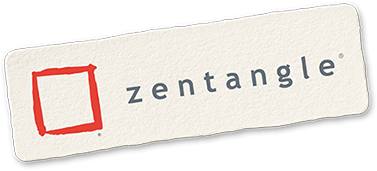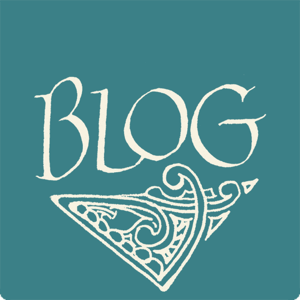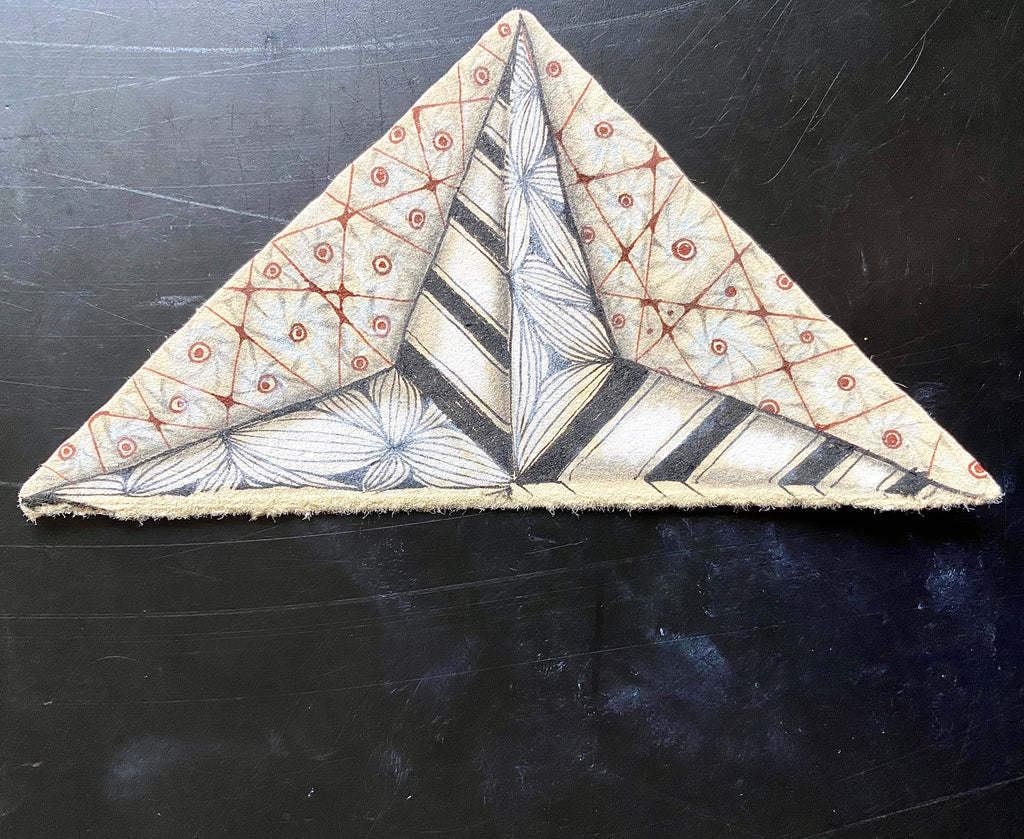Molly writes...
When someone asks me about the Zentangle Method, a few things come to mind. I usually talk about how it is a step by step approach to pattern drawing and then, depending on who I am talking to or what the circumstances are, I talk about some of the philosophy behind the method. Practicing Zentangle is the best way to understand these philosophies. I think every artist that practices Zentangle brings their own interpretation to its definition and that adds to the overall meaning. One of the most valuable and important aspects of the Zentangle philosophy for me is the “No Mistakes” philosophy. It took me years to understand fully what that meant for my practice. When we say there are no mistake in Zentangle, it is not intended to mean that there will never be an unintended stroke, spill, rip or a just plan “ugh”. What we mean is that when it does happen our reaction is not to react with disappointment, anger, or discouragement but rather to embrace it and see it as an opportunity.
This is a major shift in perspective that requires courage and trust. Once you trust and welcome that every stroke on your tile has purpose, beauty, and potential, you start to see your work differently. This can be hard at first. How can you say that what clearly appears to be a mess as potential beauty?
Well, sometimes, it takes time away from the work, sometimes it takes creative ideas for change and sometimes it takes a decision to go in a new direction. Once you open up your mind to this viewpoint you will also notice a new creative flow state. A creative flow state can only be achieved if there is nothing in its way. When an artist gets stuck on perfection, distracted by things that come out not as expected or if one places expectations on themselves that are so specific, you narrow down your success of finding a flow state in your creative process.
However, when you approach your work with openness and welcome all parts of your creative process, you start to understand their purpose and role in the bigger picture. If you believe that each stroke of your pen or mark of your pencil plays a role in all the marks that follow you start to see them differently. You see opportunity and potential. You learn to trust the creative process and embrace the humanness that makes it special. You can start to embrace how this new perspective allows you to focus on the present and then pushes you forward to the next step. Once you implement the “No Mistakes” philosophy in your artistic process you might start to see and feel it trickling into other parts of your life.
Today, we find ourselves in days of “uncertainty”. While this might be true, and this might be part of our reality, what if we took this opportunity to focus on some of the beautiful things that are emerging and all that we are grateful for. I, for one have found gratitude in the extra time at home. I have particularly enjoyed the extra snuggles with my children, discovering a new trail in the woods, spending extra time around the dinner table, working on a jigsaw puzzle, watching a movie, and drawing. I am also finding gratitude in just stopping to take a huge metaphorical breath. Sometimes the world seems to be moving so quickly, and there is so much focus on what is next that we forget to focus on where we are. These past few days, I have appreciated not having any plans. I believe and know that we will eventually return to our busy lives, but as for today I am feeling grateful for this opportunity to rest and recharge. I am trying to take note of how powerful this feeling is. I am feeling grateful for this opportunity to just take a break from it all … and knowing that I am not alone doing it. This experience will change a lot of things for a lot of people, and although there will be difficulties and challenges, there will no doubt will be beautiful things too. There will be discovery, renewal, and awesomeness …. You just have to look for it.
Updated: May 13, 2022...
It is no coincidence that many of the blogs that we are revisiting during Mental Health Awareness Month were written in the Spring of 2020. This was a time when we all were realizing just how important our mental health was. Molly's words from two years ago ring just as true today as they did then.
Updated: April 16, 2024...
One of the great things about celebrating Zentangle's 20th Anniversary is many times, we have already found the right words to say what we want to say, which is why we will be revisiting more of our older blogs this month. But, make no mistake, these thoughts are anything but outdated.



Jane Franco on
No Mistakes. How refreshing. And not only no mistakes, but those things that we saw as mistakes are actually opportunities … not to be looked upon with shame or disappointment, but with curiosity and with hope.. with a gorgeous combination of inquiry and faith.
Tammy on
Maria N Smirensky on
Joanna Kohl on
No Mistakes
Growing up, in my perfectionist mind, this was a given. Oh, sure, I heard the phrases from others. “There’s more than one way to do things.” Uh – no there isn’t. “Give yourself a break.” Not allowed to! “Not everything goes exactly right the first time.” Sorry, not in my book. Being a left-handed person in a right-handed world, I strove to match my creative endeavors with those around me, sometimes failing miserably. It wasn’t until I accepted the alternative definition, that everything I do is fine, is good, is me being me, that the whole meaning of “No Mistakes [Mis-takes]” made sense.
It’s not a mistake to have the health issues I have. How else would I have met some marvelous people or been able to cultivate the wonderful friendships that have developed? It’s not a mistake to acknowledge my own perceived shortcomings, as I become yet more empathetic to those who ache for a understanding support system. It’s not a mistake to learn to be gentle on myself in all things, to not give in to the paranoia of comparison. It’s not a mistake to be who I am, where I am, today.
Zentangle’s philosophy of No Mistakes has softened me, the pen in my hand merely laying there instead of a death-grip, just like my outlook on life is, now. It’s a matter of perspective, and each day I get to practice this method in my drawing, and in life itself. For this, I thank you.
Ginger White C.Z.T. on
I love the no mistakes philosophy and have learned to let go and know what I do is perfect no matter what and to take a mistake and change it into a beautiful opportunity. Thanks Zentangle!!!
Michele Werner on
The no mistakes philosophy of Zentangle has gotten me through may difficult times since Zentangle found me in 2013. During my second encounter with cancer in 2020, Zentangle got me through the chemo and many days that felt like I could just not continue. I had fallen away from Zentangle about 2 years prior and was brought back by the gift of 2 Zentangle books from one of our son’s friends. My 5 hours of chemo every 3 weeks became my true Zen time. I could make “no mistakes”. I could forget the world I was in at the moment and envision the future to come. The nights I could not sleep were soothed by the “no mistakes” tiles that got me through those nights and into the next day of hope. Simple somewhat straight lines and beautiful free curves became works of art. Each tile slowly blossomed before my eyes and helped to bring the cure I hoped for and needed. Today we are in a new home, a new beginning and I am back to enjoying more regular Zen time. Each day brings surprises, some not so good, but my Zentangle time helps me to accept even the mistakes we have made along the way. Thanks for helping me to find a true balance in my new world.
Judy Grimes on
Agnieszka on
I work with people that have dementia and “no mistakes” is a very important lesson in their world. I taught Zentangle to 6 people with dementia from all parts of the world, over zoom a few months ago and it was amazing what the words “no mistakes” meant to these people. Some of them have started doing Zentangle on all kinds of mediums because of those words. Thank you Zentangle!!!
alyss Amster on
Rebecca Brye on
Ellen Loonstra on
I switched the work “mistakes” to “missed takes.” As in life there are missed opportunities, but I learn from those and continue. Sometimes the outcome is so totally different from what I expected, especially in my Zentangle practice. The original would have been great, but the end product is usually beautiful also.
Mary Kay Cass, C.Z.T. on
I’m extremely self-critical with a real perfectionist tendency & always started over again when it didn’t look right or I thought I’d made a mistake. Tangling has given me a practical way of dealing with it & turning what I perceive to be a mishap when crafting or tangling into an opportunity. No mistakes reinforces my belief that God doesn’t make mistakes with our lives & that He can turn our wrong turns into something positive for Him to use.
Evy Browning on
It is so good to read about how the ‚No Mistakes‘ philosophy has changed and influenced so many people and how it gives people the strength to go on even if there are setbacks in our art process.
And most of all I love how we tanglers not only use and include this philosophy in our Zentangle practice but also use it in our lives even at the worst and darkest moments and turn them into beatable and even positive situations.
For me it is the most important philosophy.
Thank you for this beautiful blog post Molly!
Doris Bisschop on
I have been an elementary school teacher for 25 years. I began tangling years ago, and I shared my tiles with the kids. Each year, we discuss the idea that mistakes are a part of learning, especially when learning something new. The idea that there are NO mistakes took root for my students. We often say that we don’t understand something “yet”. These philosophies mesh well for a healthy mindset in my classroom and in my life!
Jennifer Loshelder on
The “No Mistakes” philosophy has had a huge impact on my art and my life. Most importantly, it has taught me to be kind to myself and not beat myself up for my mistakes.
AndreaR on
Beth Welch on
Chari-Lynn Reithmeier on
The No Mistakes philosophy of Zentangle is one of my favorite aspects of it. Personally, I have always struggled with accepting my work if it is not perfect. When I switched my thinking to No Mistakes, it freed something in me. The idea that there aren’t mistakes in my Zentangle, only opportunities to try something new. To see what unexpected possibility has now been introduced is such a different way to think about my work and life experiences.
Kathleen "Katy" Brand on
GK on
Sharon Campese on
The no mistakes philosophy is always reminding me to keep going even when things seem to be going wrong. If I keep going, in drawing or in life, it’s amazing how often something beautiful and unexpected will emerge.
Jennifer Rogers on
Alice Steuck Konkel on
Lenka Otevrel on
Aude on